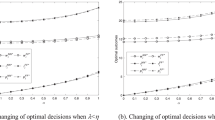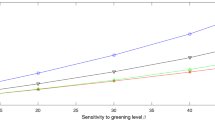Abstract
In addition to green product design, this paper introduces green logistics into a green supply chain, and studies the supply chain system composed of a manufacturer producing green products, a 3PL supplier and a retailer from the perspective of fairness. Through the construction of the game models, this paper studies the pricing, green decision-making and the supply chain members’ profits, and discusses the impact of the retailer’s fairness concern on the decision-making and performance of members. Finally, in order to improve supply chain performance under fairness concern, two contracts are designed: 3PL green cost sharing contract and combination contract. It is found that the retailer with fairness concern sets lower retail price, the manufacturer chooses lower product greenness and wholesale price, and 3PL green level is not related to fairness concern. The retailer’s fairness concern is not conducive to the manufacturer, the 3PL supplier and the whole supply chain, but beneficial to the retailer. In addition, both these two contracts improve the performance of the supply chain and get more environmental benefits. Compared with the 3PL green cost sharing contract, the combination contract plays a more significant role in making more profit for the 3PL supplier and more utility for the retailer.






Similar content being viewed by others
Availability of data and materials
The data used to support the findings of this study are included within the article.
References
Adhikari A, Bisi A (2020) Collaboration, bargaining, and fairness concern for a green apparel supply chain: an emerging economy perspective. Transp Res E-Log 135:101863. https://doi.org/10.1016/j.tre.2020.101863
Ghosh D, Shah J (2015) Supply chain analysis under green sensitive consumer demand and cost sharing contract. Int J Prod Econ 164:319–329. https://doi.org/10.1016/j.ijpe.2014.11.005
Zhang CT, Liu LP (2013) Research on coordination mechanism in three-level green supply chain under non-cooperative game. Appl Math Model 37(5):3369–3379. https://doi.org/10.1016/j.apm.2012.08.006
Li B, Zhu MY, Jiang YS, Li ZH (2016) Pricing policies of a competitive dual-channel green supply chain. J Clean Prod 112:2029–2042. https://doi.org/10.1016/j.jclepro.2015.05.017
Xu XP, He P, Xu H, Zhang QP (2017) Supply chain coordination with green technology under cap-and-trade regulation. Int J Prod Econ 183:433–442. https://doi.org/10.1016/j.ijpe.2016.08.029
Zhao R, Neighbour G, Han JJ, McGuire M, Deutz P (2012) Using game theory to describe strategy selection for environmental risk and carbon emissions reduction in the green supply chain. J Loss Prevent Proc 25(6):927–936. https://doi.org/10.1016/j.jlp.2012.05.004
Wu Q, Mu YP, Feng Y (2015) Coordinating contracts for fresh product outsourcing logistics channels with power structures. Int J Prod Econ 160:94–105. https://doi.org/10.1016/j.ijpe.2014.10.007
Yu YL, Xiao TJ (2017) Pricing and cold-chain service level decisions in a fresh agri-products supply chain with logistics outsourcing. Comput Ind Eng 111:56–66. https://doi.org/10.1016/j.cie.2017.07.001
Giri BC, Sarker BR (2017) Improving performance by coordinating a supply chain with third party logistics outsourcing under production disruption. Comput Ind Eng 103:168–177. https://doi.org/10.1016/j.cie.2016.11.022
Zhang C, Fan LW, Tian YX (2020) Optimal operational strategies of capital-constrained supply chain with logistics service and price dependent demand under 3PL financing service. Soft Comput 24(4):2793–2806. https://doi.org/10.1007/s00500-019-04560-9
Fu H, Ke GY, Lian ZT, Zhang LM (2021) 3PL firm’s equity financing for technology innovation in a platform supply chain. Transp Res E-Log 147:102239. https://doi.org/10.1016/j.tre.2021.102239
Jamali MB, Rasti-Barzoki M (2019) A game theoretic approach to investigate the effects of third-party logistics in a sustainable supply chain by reducing delivery time and carbon emissions. J Clean Prod 235:636–652. https://doi.org/10.1016/j.jclepro.2019.06.348
Lee DH (2020) Strategies on pricing, greenness degree, and carbon emission reduction in supply chains under single and cross distributions of green and nongreen products. Math Probl Eng. https://doi.org/10.1155/2020/1246536
Cui TH, Raju JS, Zhang ZJ (2007) Fairness and channel coordination. Manage Sci 53(8):1303–1314. https://doi.org/10.1287/mnsc.1060.0697
Pavlov V, Katok E (2011) Fairness and coordination failures in supply chain contracts. SSRN Electron J. https://doi.org/10.2139/ssrn.2623821
Katok E, Pavlov V (2013) Fairness in supply chain contracts: a laboratory study. J Oper Manag 31(3):129–137. https://doi.org/10.1016/j.jom.2013.01.001
Zhou YJ, Bao MJ, Chen XH, Xu XH (2016) Co-op advertising and emission reduction cost sharing contracts and coordination in low-carbon supply chain based on fairness concerns. J Clean Prod 133:402–413. https://doi.org/10.1016/j.jclepro.2016.05.097
Ho TH, Su XM, Wu YZ (2014) Distributional and peer-induced fairness in supply chain contract design. Prod Oper Manag 23(2):161–175. https://doi.org/10.2139/ssrn.2246818
Du SF, Wei L, Zhu YG, Nie TF (2018) Peer-regarding fairness in supply chain. Int J Prod Res 56(10):3384–3396. https://doi.org/10.1080/00207543.2016.1257872
Ma P, Li KW, Wang ZJ (2017) Pricing decisions in closed-loop supply chains with marketing effort and fairness concerns. Int J Prod Res 55(22):6710–6731. https://doi.org/10.1080/00207543.2017.1346324
Li QY, Guan XT, Shi TQ, Jiao W (2020) Green product design with competition and fairness concerns in the circular economy era. Int J Prod Res 58(1):165–179. https://doi.org/10.1080/00207543.2019.1657249
Xu MX, Yu Y, Hu YS (2014) Service and revenue sharing strategies in a dual-channel supply chain with fairness concerns. Comput Model New Technol 18(7):244–252
Wang WL, Ren QN, Zhai XN, Zhang SX (2021) Decisions of pricing, low-carbon level and service level in a platform supply chain considering fairness concern and manufacturers’ competition. Control and Decision. https://doi.org/10.13195/j.kzyjc.2020.0720
Wang Y, Hou GS (2020) A duopoly game with heterogeneous green supply chains in optimal price and market stability with consumer green preference. J Clean Prod 255:120161. https://doi.org/10.1016/j.jclepro.2020.120161
Lin ZB, Chen MF (2020) Green manufacturing strategy and supply chain coordination with corporate social responsibility perspective. Comput Integr Manuf Syst 26(11):3108–3117. https://doi.org/10.13196/j.cims.2020.11.021
Fehr E, Schmidt KM (1999) A theory of fairness, competition, and cooperation. Q J Econ 114(3):817–868. https://doi.org/10.2139/ssrn.106228
Pu XJ, Jin DL (2015) Fairness preference, reference point effect and operation research in three-layer supply chains. Control Decis 30(05):859–864. https://doi.org/10.13195/j.kzyjc.2014.0121
Du SF, Du C, Liang L, Liu TZ (2010) Supply chain coordination considering fairness concerns. J Manag Sci China 13(11):41–48
Pu XJ, Zhuge RJ, Fan WD (2014) Impact of horizontal fairness and vertical fairness on strategies in dual-channel supply chain. J Syst Eng 29(04):527–536. https://doi.org/10.13383/j.cnki.jse.2014.04.025
Ma P, Zhang C, Hong XP, Xu H (2018) Pricing decisions for substitutable products with green manufacturing in a competitive supply chain. J Clean Prod 183:618–640. https://doi.org/10.1016/j.jclepro.2018.02.152
Funding
This study is supported by National Natural Science Foundation of China (nos. 71671079, 71361018).
Author information
Authors and Affiliations
Corresponding author
Ethics declarations
Conflict of interests
The authors have no conflict interests to declare that are relevant to the content of this article.
Additional information
Publisher's Note
Springer Nature remains neutral with regard to jurisdictional claims in published maps and institutional affiliations.
Rights and permissions
About this article
Cite this article
Wang, S., Wang, G., Zhao, S. et al. Pricing and green decision-making in a three-echelon supply chain considering fairness concern with the participation of green logistics. Evol. Intel. 16, 1285–1307 (2023). https://doi.org/10.1007/s12065-022-00737-8
Received:
Revised:
Accepted:
Published:
Issue Date:
DOI: https://doi.org/10.1007/s12065-022-00737-8




